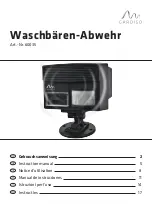
26
3.2.6 Alarm 1 Menu (continued)
ACTIVE SUBMENU:
Press
d
Press
d
11)
Display flashes previous selection. Press
b
to scroll
through the available selections:
ABoV
Above,
BELo
Below,
HI.Lo
HI/Low and
BAND
Band. (Band is active if
_DEV
Deviation was selected).
12)
Display shows
STRD
stored message momentarily and
then advances to
A.P.oN
only if it was changed, otherwise
press
a
to advance to
A.P.oN
Alarm Enable/Disable at Power
On Submenu.
Above:
Alarm 1 condition triggered when the process variable is greater than the
Alarm Hi Value (Low value ignored).
Below:
Alarm 1 condition triggered when the process variable is less than the
Alarm Low Value (Hi value ignored).
Hi/Low:
Alarm 1 condition triggered when the process variable is less than the
Alarm Low Value or above the Hi Value.
Band:
Alarm 1 condition triggered when the process variable is above or below
the “band” set around Setpoint 1. Band equals Hi Value (Low Value ignored). A
“band” is set around the set point by the instrument only in the “Deviation” Mode.
The Band for the AL 1 would be following the Setpoint 1 value.
The Band for the AL 2 would be following the Setpoint 2 value.
The Band or the Deviation Value should be entered under:
AL1 High (if they want Alarm 1)
AL2 High (if they want Alarm 2)
AL Low value is ignored in the Band mode.
Example:
if customer requires a Deviation Value of ±10 degrees around a
setpoint (using Output 2 as alarm)
Alarm 2: - Deviation
Contact Closure type: Deviation -- Band
AL2 High: 10 (Band they want around Setpoint 2)
Then the Band Value is to be entered under AL2 HI: 10 not 80 + 10 = 90
Summary of Contents for i16-AL
Page 17: ...13 3 2 Menu Configuration Figure 3 1 Flow Chart for ID and Set Points Menu...
Page 45: ...NOTES...
Page 46: ...NOTES...
Page 48: ...M5290 N 0613...
















































